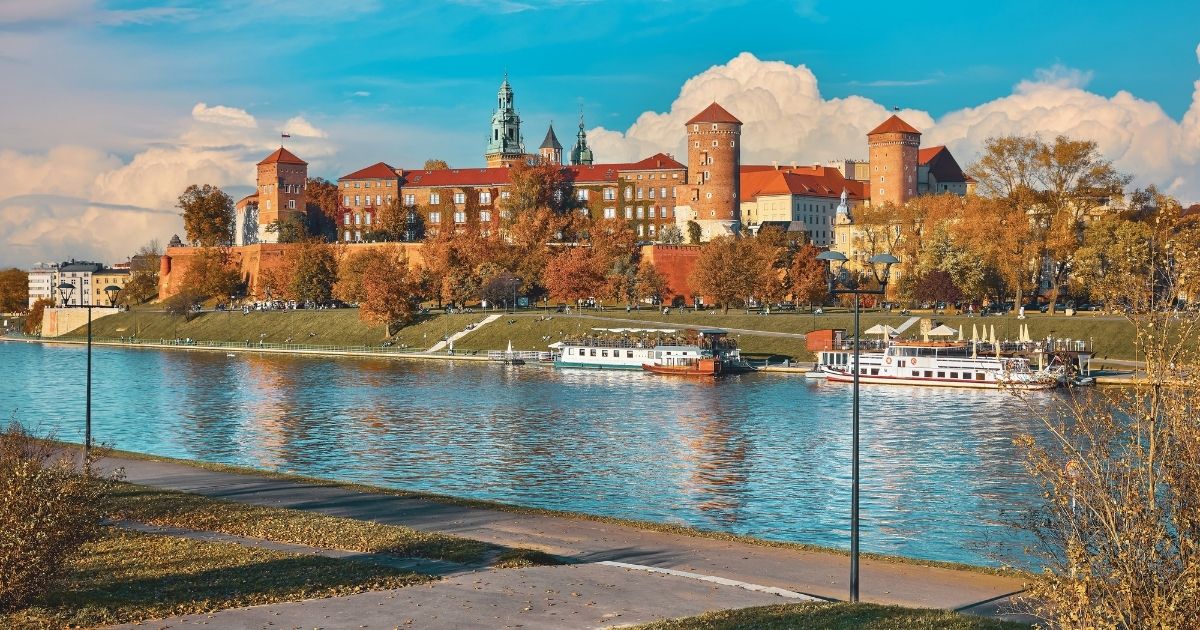The call of the medina, the scent of spice markets, and the contrast between ancient traditions and modern amenities make Morocco an attractive destination for location-independent professionals. With its rich culture, affordable living, and proximity to Europe, Morocco presents a compelling case for digital nomads seeking North African experiences.
Working remotely as a digital nomad in Morocco gives you a unique opportunity to explore diverse landscapes while experiencing unique advantages and challenges. The country’s growing infrastructure makes it viable for the digital nomad lifestyle, though with considerations distinct from established remote work destinations.
Visa requirements for digital nomads in Morocco
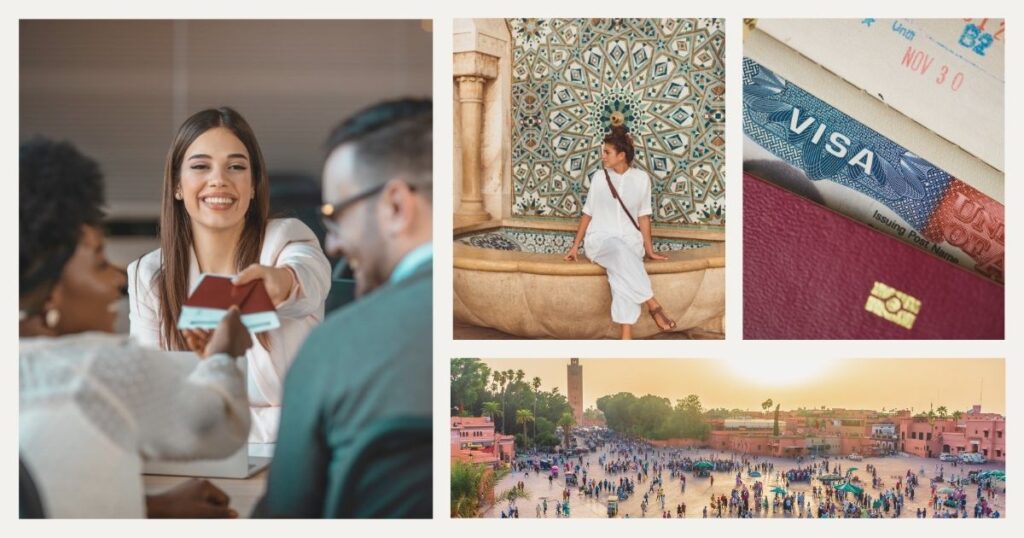
Understanding Morocco’s visa policies is essential for any digital nomad planning an extended stay.
Tourist visa options and limitations
Most Western travelers can enter Morocco visa-free for up to 90 days. This tourist exemption applies to citizens of the United States, Canada, European Union countries, and many others, making Morocco accessible for digital nomads seeking a taste of North African life.
The significant limitation: Morocco doesn’t offer simple visa extensions or visa runs to reset your tourist stay. Once your 90 days expire, you’re expected to leave for at least 90 days before returning. This creates a natural limit on how long digital nomads can continuously work from Morocco.
🌟 Pro tip: plan your Morocco stay with the 90-day limit in mind. Consider incorporating it into a broader travel itinerary that includes nearby countries like Spain or Portugal, which offer different visa terms and can complement your North African experience.
Long-term options for digital nomads
For those wanting to establish a more permanent base as a digital nomad in Morocco, several pathways exist, though none are specifically designed for remote workers. Obtaining a residence permit typically requires:
- Establishing a Moroccan company or partnership
- Securing employment with a local company
- Marrying a Moroccan citizen
- Enrolling in a Moroccan educational institution
These options require significant commitment and paperwork. The residence permit process typically demands patience, local assistance, and multiple visits to government offices. While Morocco doesn’t currently offer a dedicated digital nomad visa program, the government has shown increasing interest in attracting international talent.
💡 Did you know? Morocco has been investing in its “Vision 2025” tourism strategy, which increasingly recognizes the economic value of long-stay visitors like digital nomads. Industry observers anticipate the country may introduce specific visa provisions for remote workers in the coming years.
Internet and connectivity for remote work
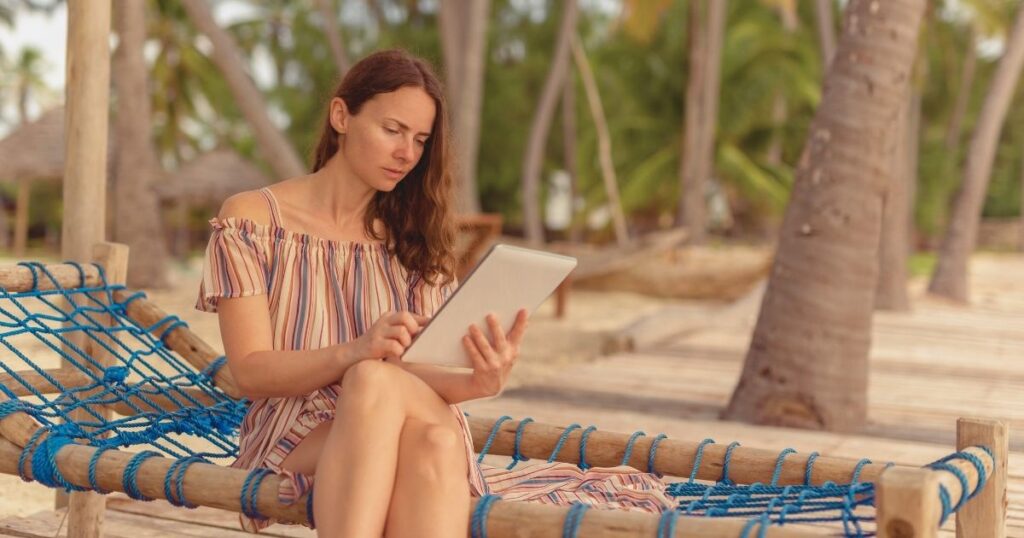
Reliable internet forms the cornerstone of successful remote work in Morocco.
Internet infrastructure reality
Morocco’s internet infrastructure varies dramatically between urban and rural areas. Major cities like Casablanca, Rabat, and Marrakech offer reasonably good connectivity, with average speeds of 15-30 Mbps. Fiber optic connections are increasingly available in metropolitan zones, providing speeds up to 100 Mbps in select neighborhoods.
The situation changes significantly in smaller towns and rural areas, where connections can be unreliable. Even in tourist-friendly coastal towns like Essaouira or Taghazout (popular with digital nomads), internet stability can be unpredictable during peak tourist seasons.
When selecting accommodation, always verify the internet situation in advance. Many rental listings advertise WiFi without specifying speeds or reliability. Requesting speed tests from hosts before booking can save considerable frustration.
Mobile data and connectivity solutions
For digital nomads prioritizing reliable connectivity, having backup options is essential. The country’s mobile data network offers a practical alternative to fixed-line internet, with 4G coverage available across most populated areas.
Major providers like Maroc Telecom, Orange, and Inwi offer affordable prepaid data packages. A typical 30-day plan with 10GB costs approximately 100 MAD (about $10 USD). For those requiring constant connectivity, a reliable travel eSIM from Holafly provides the advantage of setting up your connection before arrival, eliminating the hassle of purchasing local SIM cards.
🌟 Pro tip: prepare a connectivity strategy that combines multiple solutions. Use a portable WiFi device as backup during important calls. Research coworking spaces and reliable cafés that can serve as emergency workspaces during disruptions.
Cost of living for digital nomads in Morocco

One of Morocco’s strongest appeals for digital nomads is its favorable cost-to-quality ratio, offering authentic experiences at prices lower than Western countries.
Budget expectations and planning
The cost of living for a digital nomad in Morocco varies based on lifestyle choices and location, but generally remains affordable. A comfortable monthly budget might range from:
- Basic lifestyle: $800-1,200 USD
- Mid-range lifestyle: $1,200-2,000 USD
- Luxury lifestyle: $2,000+ USD
Housing represents the most variable expense. In Marrakech or Casablanca, a one-bedroom apartment in central areas typically costs $300-500 monthly. Coastal towns popular with digital nomads often command premium prices during high season but offer discounts for longer-term rentals.
Daily expenses remain reasonable throughout the country:
- Local meal: $3-5
- Western-style meal: $8-15
- Coffee in a café: $1-2
- Monthly gym membership: $20-40
- Local transportation: Under $1 per trip
For digital nomads accustomed to Western prices, Morocco offers an opportunity to either reduce expenses significantly or upgrade lifestyle quality while maintaining similar budget levels.
Banking and financial considerations
Managing finances as a digital nomad in Morocco requires strategic planning. The country operates primarily as a cash economy outside major urban centers, though credit cards are increasingly accepted in tourist areas.
Morocco’s currency, the dirham (MAD), is a closed currency, meaning it cannot legally be taken out of or brought into the country beyond small amounts. This restriction affects how digital nomads manage their finances, often necessitating regular ATM withdrawals rather than one-time currency exchanges.
Foreign transaction fees can accumulate quickly, making it worthwhile to research banking options that minimize these charges. Many digital nomads utilize borderless banking solutions like Wise or Revolut to reduce currency conversion costs.
Best Moroccan cities for digital nomads
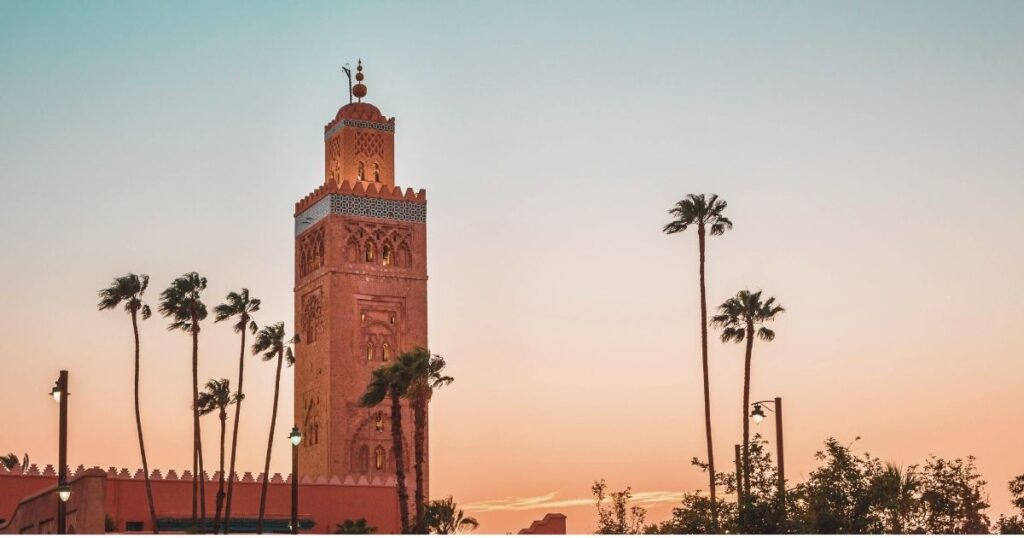
Morocco offers remarkable diversity in its cities and regions, each providing distinct advantages for remote workers.
Marrakech: the digital nomad hub
Marrakech has emerged as Morocco’s premier destination for digital nomads, balancing traditional charm with developing infrastructure. The city offers:
- Established coworking spaces, including Nest and Coworking du Maroc
- A growing international community facilitating connections
- Transportation links to Europe and other Moroccan destinations
- Relatively stable internet infrastructure in newer areas
Most digital nomads choose accommodations in the newer Gueliz district for its modern amenities and reliable internet, while enjoying the medina for cultural experiences and dining. This dual nature of Marrakech allows digital nomads to balance authenticity with practicality.
Coastal alternatives: Essaouira and Taghazout
For digital nomads seeking a more laid-back atmosphere, Morocco’s coastal towns provide attractive alternatives:
Essaouira: this UNESCO-listed coastal city offers a blend of history, culture, and beachside living. The consistent trade winds keep summer temperatures milder than inland cities. The growing expat community has sparked development of digital nomad-friendly infrastructure.
Taghazout: originally a small fishing village, Taghazout has transformed into Morocco’s surf capital and a digital nomad hotspot. The town offers dedicated coworking spaces like SunDesk that cater to remote workers. The relaxed atmosphere creates an ideal setting for work-life balance.
🌟 Pro tip: consider splitting your time between Morocco’s different regions to experience the country’s remarkable diversity. Many digital nomads begin in Marrakech to establish connections and then transition to coastal towns once they’ve developed a comfortable routine.
Cultural adaptation and daily life
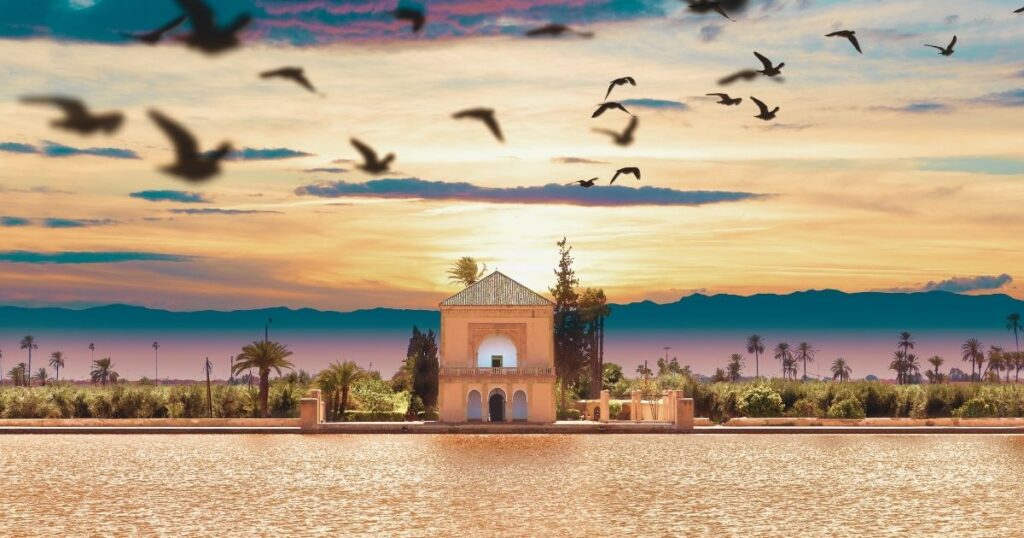
Thriving as a digital nomad in Morocco extends beyond practical considerations to cultural understanding.
Cultural norms and etiquette
Morocco’s culture blends Arab, Berber, and French influences, creating unique social codes. Understanding and respecting these differences enhances your experience:
- Dress modestly, particularly outside tourist areas
- Learn basic Arabic or French phrases, as English proficiency varies widely
- Respect religious practices, especially during Ramadan
- Understand the importance of the right hand for eating and exchanging items
- Appreciate that relationships often precede business
Digital nomads who make efforts to adapt to local customs often report more meaningful connections and access to authentic experiences beyond the typical tourist path.
Workspace options and productivity
The remote work infrastructure in Morocco continues developing, with options varying between cities:
- Coworking spaces: primarily concentrated in Marrakech, Casablanca, and Rabat, offering not just reliable internet but community events and networking opportunities
- Café culture: Morocco’s café tradition provides options for occasional work sessions, though cultural norms in traditional establishments may not accommodate extended laptop use
- Home offices: most apartments include WiFi, though reliability varies between neighborhoods
Many digital nomads adopt a hybrid approach, combining home-based work with visits to coworking spaces for networking and reliable connectivity. This flexibility allows adaptation to Morocco’s sometimes unpredictable infrastructure.
Final thoughts on the digital nomad experience in Morocco
Morocco offers a distinctive proposition for digital nomads seeking cultural richness, affordability, and proximity to Europe. The country’s blend of ancient traditions and modernizing infrastructure creates an environment enriched by extraordinary surroundings.
While challenges exist – particularly around visa limitations, internet reliability, and cultural adjustments – the rewards of experiencing life as a digital nomad in Morocco can be profound. The country’s diversity allows for experiences ranging from cosmopolitan city living to laid-back coastal towns.
For those ready to embrace both the opportunities and adaptations required, Morocco offers an unforgettable chapter in the digital nomad journey. The landscape for remote work continues evolving, with improving infrastructure and growing recognition of remote workers’ value. Before embarking on your Moroccan adventure, review resources on visa requirements and connectivity through Nomada.
Looking to make your transition to becoming a digital nomad in Morocco smoother? Nomada’s country guides provide comprehensive resources tailored to remote professionals seeking authentic experiences while maintaining productivity in North Africa.
Your journey into the vibrant world of remote work in North Africa begins here 👉
Frequently asked questions about being a digital nomad in Morocco
Morocco offers a rewarding but sometimes challenging environment for first-time digital nomads. The country works best for those with some previous remote work experience. Consider starting in established digital nomad hubs like Marrakech before exploring less connected areas.
In major cities and established coworking spaces, the internet generally supports video calls, though occasional disruptions occur. Always have a backup connection option for important meetings and avoid scheduling critical calls during peak usage times.
Spring (March-May) and fall (September-November) offer the most pleasant climate. Summer temperatures can exceed 100°F (38°C) in inland cities like Marrakech, while coastal areas remain more temperate year-round.
Morocco is generally safe for digital nomads, with violent crime rates lower than many Western countries. Standard precautions apply: secure your valuables, maintain awareness in crowded areas, and research neighborhood safety before choosing accommodation.
Yes, though approaches differ from Western markets. For stays beyond a few weeks, working with local contacts often yields better results than online platforms. Many digital nomads start with a short-term booking, then negotiate longer stays directly with owners for discounts.




